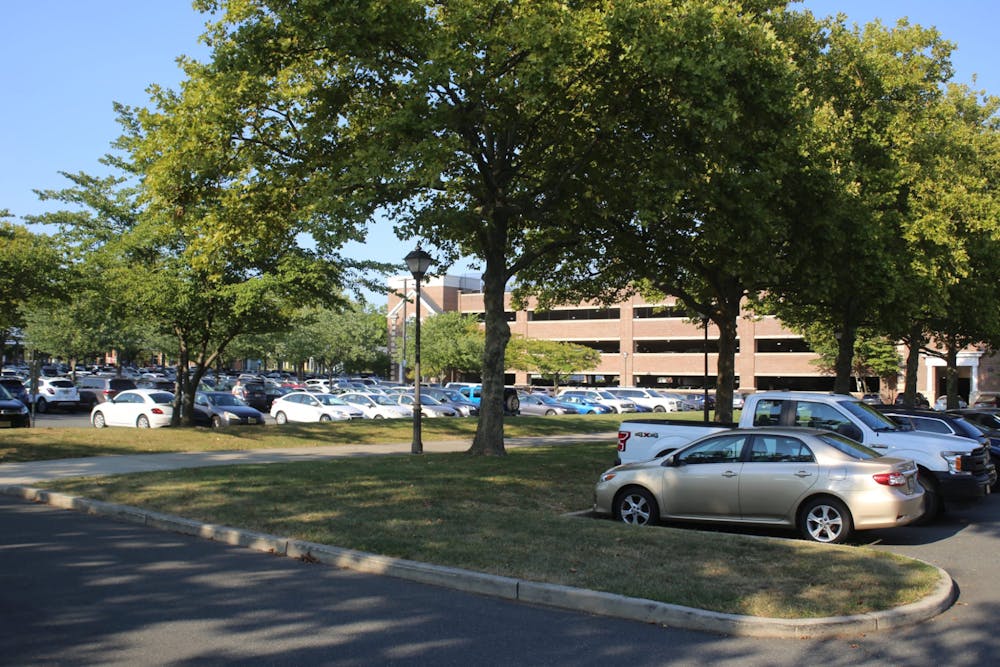By Isabella Darcy
News Editor
Crowded parking lots caused commuter Joyle Jaramillo, a freshman mathematics major, to be late to her first ever class at the College. Jaramillo, like many other commuters, now arrives on campus extra early to ensure that she has time to find a parking space amongst the sea of vehicles that typically flood commuter lots.
“The whole parking lots were filled, and the parking garage was filled. Even the top floor,” said Jaramillo, “I just kept going around and around until someone left, and then I got lucky.”
Many commuters have expressed frustration with how difficult it can be to find parking in lots 5, 6 and 7, the College’s designated commuter lots. Later this month, however, about 60 new parking spaces will become available to commuters, according to Sharon Blanton, vice president for operations.
The soon-to-be-available spaces are located in Lot 4, which is currently reserved for faculty and staff.
“There's a whole row of uncovered parking spaces which seem to be really underutilized this semester,” Blanton said. “We're going to make those available to commuter students.”
The College is currently putting some signage together before it officially launches what will be an experimental pilot program for parking. An announcement will be made to the campus when the pilot program is ready, according to Blanton.
Commuters who cannot find parking in lots 5, 6, or 7 already have the option to park on the upper levels of lot 13, which is the parking garage closest to Decker and Cromwell halls.
“There are tons of spaces available in the Decker garage,” said Blanton. “That's just always the case, I mean at least an entire floor is empty, pretty much every day.”
For some commuter students, finding any available spaces in lot 13 is a rarity. Many commuters often arrive at similar times, usually before class periods start, which can lead to busy parking lots.
“Decker is always crowded though, so I feel like it's kind of hard to find parking,” said Genis Espinal, a junior biology major who commutes to campus.
Like Jaramillo, Espinal gets to campus at least 30 minutes early so that she has extra time to find a place to park. Espinal told The Signal that finding parking on campus this semester has been more difficult for her compared to previous semesters.
The pilot program comes at a time when parking at the College is experiencing some updates.
The College recently switched from the system of parking management that it had been using to a cheaper version, which essentially has the same features.
“What we wanted to do was to find a system that would allow us to keep the same general kinds of parking management rules and regulations that we already have,” said Blanton.
The College is also considering implementing technologies that would increase efficiency in the way it handles parking, such as implementing new license plate readers. These devices would assist with ticket enforcement.
“In time we’re going to go to that process,” Scott Sferra, executive director of student accounts, told The Signal. “We're going to have a vehicle that can drive through and scan plates, and make it extremely more efficient.”
Neither Sferra nor Blanton specified when the new license plate readers will be implemented.
Currently, when enforcing ticketing, Campus Police officers check parking stickers on foot and use a handheld ticket writer that requires officers to punch in license plate numbers to check if a plate is registered to be parked in a space.
“Instead of having human beings walking around…you can just very quickly drive through a parking area scanning the license plates,” said Blanton. “It will tell us if that person has a parking sticker or not, and if they're parked in their appropriate place.”
Blanton told The Signal that she hopes one day the College will do “everything by license plate” and save money by no longer needing to hand out parking stickers or maintain parking lot entrance gates.
The entrance gates are old, prone to failure and cost a lot to fix, according to Blanton. Replacing the gates with license plate readers would not only eliminate maintenance costs, but would also allow for the College to immediately know whether or not drivers are in the correct lot.
With the coming updates to parking space allocation and technological advancements, parking on campus and the way it is enforced is evolving.
“There are a lot of features here,” said Blanton. “It's going to take us a little bit of time to roll everything out, so right now we're kind of reproducing what we were doing before, but a little bit more efficiently.”







